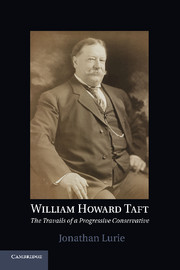Epilogue
Published online by Cambridge University Press: 05 December 2011
Summary
Although not apparently given to deep introspection, Taft was quick to note, as he did soon after Harding’s inauguration, that “I would rather have been Chief Justice than President.” Almost four years into his tenure as Chief Justice, he recalled that “in my present life I don’t remember that I ever was president.” Of course, no president ever forgets his term in office, and neither did Taft. One suspects that he was referring to much of the unpleasantness that dogged him – especially after 1911. He wrote no memoir, unlike his wife, but he amassed thousands of letters and documents. Taft had planned to have Gus Karger write his biography, yet that project terminated with Karger’s unexpected death in 1924.
In his outstanding biography of Louis Brandeis, Melvin Urofsky asks, “How did a man who throughout his life considered himself a conservative become a liberal icon?” For a study of Taft, the question might be “how did a self-proclaimed progressive-conservative become so widely seen as an old school traditionalist?” In these chapters, I have argued that until Taft went on the High Court, he had indeed been a progressive conservative. Yet Urofsky’s query has relevance for this study. It forces us to rethink not only what the hidebound terms “conservative” and “progressive” meant in Taft’s era, but also what they have come to mean today. The contemporary historian still confronts, and should resist, the tendency to produce “Whig” history – that is, to look at the past through contemporary values of the present (in this instance, post–New Deal and progressive historiography) rather than through the values and mores of the era that is the subject of historical inquiry. As one examines the themes highlighted in these chapters, one realizes, hopefully, that what Taft meant by the word “conservative” is not necessarily what contemporary historians mean.
- Type
- Chapter
- Information
- William Howard TaftThe Travails of a Progressive Conservative, pp. 195 - 200Publisher: Cambridge University PressPrint publication year: 2011



